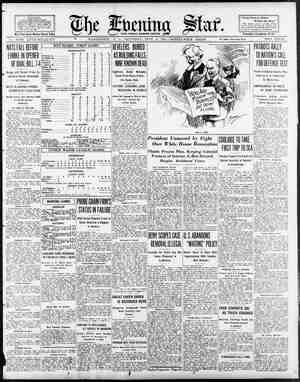The Daily Worker Newspaper, July 4, 1925, Page 7
You have reached the hourly page view limit. Unlock higher limit to our entire archive!
Subscribers enjoy higher page view limit, downloads, and exclusive features.
oe ey ——_ sil aiticanietalembeitaaiaiel Er 5 — Astration. - therefore had two major problems to WORKERS! RAISE THE DEMAND, “HANDS OFF CHINA!” SPECIAL MAGAZINE SUPPLEMENT neg SS tte | “The idea becomes | power when it pene- trates “the masses.” ~—Karl Marx. SATURDAY, JULY 4, 1925 THE DAILY WORKER. << 20 This magazine supple- ment will appear every Saturday in The Daily Worker. WHERE DOES AMERICAN LABOR STAND? With the Workers and Farmers of Mexico or with Wall Street? By WILLIAM. F. DUNNE. - Immediately following the publication of Secretary of State Kel- logg’s threat to the Callies’ govern- ment the president took with him on hie week-end cruise on the Mayflower not only Mr. Kellogg, but General Pershing, who ied the expeditionary force in pursuit of Villa, and General Lejeune, commandant of the marines, who has had the experience in mili- tary operations in Mexico and would direct any landing of sea forces if a demonstration should be determined upon.—(Washington dispatch to the Chicago Tribune, June 15.) HE Coolidge policy is one of “firm- ness” in dealing with the work- ing class at home and firmness in dealing with the workers and farmers in the outlying sections of the Ameri- can empire. There is no dualism in this policy —it is the iron hand of American im- perialism which suppresses the work- ing class at home so that it can be used as material for punitive expe- ditions in Latin-America to enforce upon still more oppressed workers and peasants the rule of the lords of finance: and industrial capital whose offices are in Wali Street. MERICAN imperialism has two kinds of tactics which it uses in Latin-America: (1) It secures financial control of basic industries (copper mines, oil wells, timber, hemp, jute and banana plantations, waterpower, railways) and then either by fomenting revolts, by wholesale purchase of officials— or by both methods—secures control of the government. This policy has ‘been followed in Chile and other Lat- in-American nations. (2) It follows financial penetration by open military aggression as in Haiti and Santo Domingo—it ‘“occu- pies” these\countries and sets up Am- erican military dictatorships. Mexico a combination of both these policies has been adopted. The oil and mining concerns firat con- trolled the Diaz government. After its overthrow they financed revolts against its successors and these re- volts were made excuses for military intervention during the Wilson admin- Since that time no reform govern- ment has been able to carry out the agrarian program on which all of them won their support from the Mexican masses without running foul of the American state department, Every Mexican government has solve—the internal one of carrying out the distribution of the land among thé peons and the external one of maintaining its sovereignty while car- rying out an agrarian policy to which the American mortgage holders are opposed. The term “American mortgage hold- ers” is used advisedly. F ever a nation was in pawn to for- eign capital it is Mexico. The internal debt of Mexico—the amount owed inside the country is only $67,606,000—not a large sum for a population of approximately 14,000,- 000. But— The external debt, owed to Ameri- can capitalists and secured by cus- toms duties, government securities and the railway properties, amounts to $441,224,777. To this must be added the claims of Americans for property damage re- sulting from the revolutions estimated at $500,000,000! Mortgaged Mexico! Mortgaged for a billion dollars to the most. powerfuly financial group in the world! : this conference of the) * commander-in-chief of the army and * navy with these high officers and the secretary of state was intended as a subtle hint to President Calles that the Coolidge administration is prepared to go to whatever lengths are necessary to protect American rights in Mexico.—(Washington dis- patch to the Chicago Tribune, June 95). “To protect Mexico.” It might be will to say here that whatever “rights” America has in Mexico have been secured by a series of briberies and butcheries beginning with the stinking Diaz government and extending down to the procured American rights in —~ The Showdown in the Orient. betrayal of the Mexican labor move: ment to Wall Street by the El Paso convention of the American Federa- tion of Labor and it should be further understood that American imperialism claims in Mexico privileges not pro- vided for Mexican capitalists them- selves in the gonstitution of the Mex- ican republic¢ In particualr does Wall Street ob- ject to the distribution of the large estates to the peasantry and to the (Continued on Page 8) An Unlacky Number for World Imperialism se ea ms


